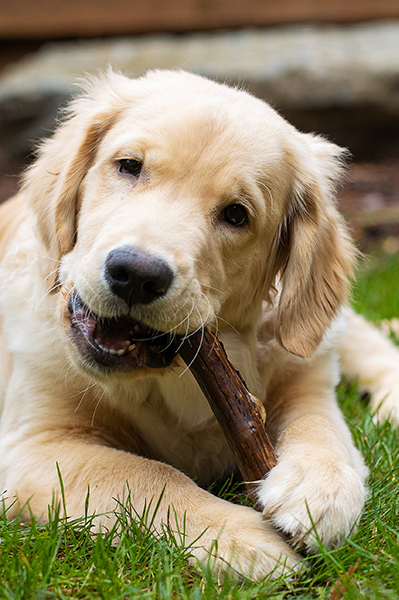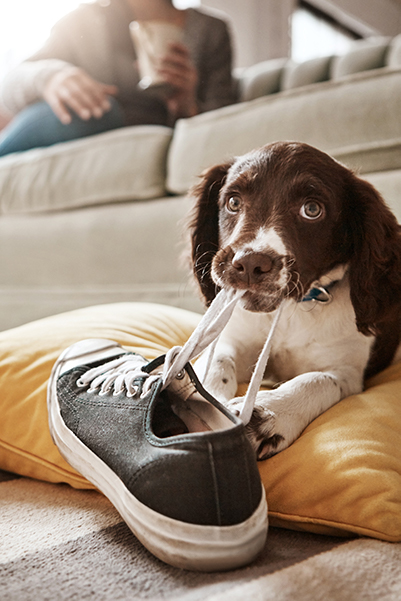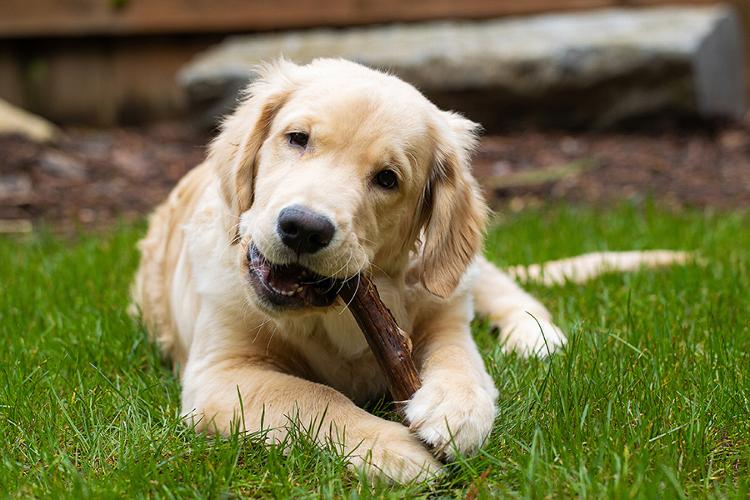From Biting to Chewing: Understanding Your Puppy's Nibbling Habits
Puppies are cute, cuddly, and full of energy, but they also come with a set of sharp little teeth that can cause quite a bit of discomfort. As a new puppy owner, you may have already experienced the infamous puppy nibbling and biting phase. Whilst it may be frustrating and even painful at times, it's important to understand that this behaviour is completely normal and necessary for your puppy's development. In this blog post, we will delve into the world of puppy nibbling and explore why puppies do it, how to manage it, and when it may become a cause for concern. So, grab a cup of tea and let's learn more about our furry friends' nibbling habits.
Why Does Your Puppy Nibble?
Puppy nibbling, adorable yet bewildering, is a natural stage in your pup's development journey. Much like infants, puppies discover their surroundings through their tiny mouths. This exploratory nibbling lets them investigate different textures, savour new tastes, and gather knowledge about their environment. Then comes the teething phase. Between the tender age of three to six months, your fur baby's new teeth begin to erupt, leading to discomfort. Here's where nibbling plays a soothing role, easing the teething pain. But that's not all; nibbling helps your pup form a connection too. It is a social ritual puppies use to form bonds with their canine companions and their human families. So the next time your little furry buddy nibbles on your hand, remember, it's not just about teething or exploration. It's also their unique way of bonding with you.

Differentiating Playful Nibbling from Aggressive Biting
Grasping the nuances between playful nibbling and aggressive biting can be a game-changer in steering your puppy's development onto the right path. When your pup's nibbling is paired with a relaxed posture, a happily wagging tail, and exuberant leaps, it's merely an expression of playfulness. However, it's time to sit up and take notice when this behaviour escalates to biting with signs of aggression. Signs to watch out for include a rigid body stance, ominous growls, or the showing of teeth. It's crucial to understand that this is not just boisterous play; instead, it signals a deeper issue. Should you notice any signs of aggressive biting, don't shy away from seeking immediate professional assistance. It's far better to tackle such behaviours head-on, early on, before they get a chance to become deeply ingrained habits.
Encouraging Appropriate Chewing Behaviour
Turning the tide on your pup's destructive chewing habits can be a challenging task, yet with the right approach, it is definitely achievable. The key is to divert their gnawing tendencies towards suitable alternatives. Introducing a variety of chew toys, with diverse textures and degrees of firmness, can provide your pup with a choice of appropriate chew outlets. When they opt for a chew toy over your beloved furnishings, it's time to celebrate their wise decision. Heap praises on them and reward them with their favourite treat. This positive reinforcement will instil in them the understanding that selecting chew toys over off-limit items earns them accolades and goodies. Just remember, in this endeavour of shaping your pup's behaviour, patience and consistency are your greatest allies.
Teaching Your Puppy Bite Inhibition
Bite inhibition is a valuable skill for puppies to master, indicating their ability to moderate the force of their bite. This essential lesson, usually absorbed during their early interactions with fellow littermates, can be replicated by you at home. When puppies get overly zealous in their play-biting, the recipient puppy typically yelps and the game halts, signalling to the overly-enthusiastic puppy that it has crossed a line. You can echo this conduct if your own furry friend bites too enthusiastically. Emit a sharp 'ouch' sound, withdraw your hand and momentarily cease the playtime. This sequence helps to reinforce the message that overly hard biting is unacceptable and disrupts the fun. Importantly, this method of teaching bite inhibition should be applied consistently to guide your puppy towards better understanding and control of their nibbling habits.

The Role of Socialisation in Nibbling Behaviour
Socialisation is an instrumental factor that moulds your puppy's nibbling habits. A well-socialised pup, exposed to various dogs, humans, and environments, is often more adept at regulating the force of their bite. You can support your puppy's social development by arranging regular play dates with other puppies. These interactions offer them a learning platform, where they can refine their understanding of acceptable biting behaviour, all while having a great time. Always remember to be present and vigilant during these play sessions to ensure the safety and comfort of all furry participants. This gradual exposure to different social contexts will help your puppy navigate their nibbling habits and contribute positively to their overall behavioural development.
When to Seek Professional Help
Sometimes, despite your best intentions and efforts, your puppy's nibbling can develop into something more serious. Unchecked aggressive biting or the tendency to destroy precious household belongings with their persistent chewing are warning signs that require expert intervention. In such circumstances, don't hesitate to enlist the expertise of a professional dog trainer or behaviourist. It's essential to address these nibbling issues early on to prevent more significant behavioural problems as your puppy grows up. Always remember, seeking help is not a sign of defeat, but rather a testament to your commitment to your pup's well-being. So if your furry friend's nibbling habits leave you feeling overwhelmed, seek help from the professionals. They can offer valuable guidance and effective strategies to help guide your puppy through this challenging phase. This early intervention can lay the groundwork for a lifetime of peaceful coexistence.
Get in touch today to start your path to having a healthier relationship with your dog, JanB Dog Training would love to be a part of your journey!
TEL:07398862440
EMAIL: Support@JanBDogTraining.com
